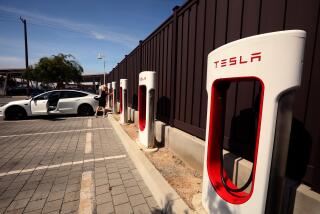Car Dealers Putting Mechanics in Driver’s Seat
- Share via
GLENDALE — Have wrench, will travel.
Eager to inspire more customer loyalty in an increasingly competitive marketplace, Toyota Motor Sales USA and General Motors have recently begun testing a service that could save some consumers a trip to the mechanic.
Late last year, Toyota of Glendale became one of only three Toyota dealerships in the nation to participate in a pilot program in which some light auto repairs, especially warranty and recall work, can be done at the customer’s home or office.
The program is similar to one announced in January by General Motors, the nation’s No. 1 auto maker, and to one launched nationwide by Chrysler in 1997.
In each case, company officials say, the overall aim is to improve customer service and, by extension, customer devotion.
Major at-home overhauls remain prohibited by municipal codes and homeowner association restrictions in many areas. Still, experts say the service is one more attempt by the auto industry to woo consumers who are growing ever more accustomed to having the world delivered to their door.
“It’s another example of auto manufacturers becoming more consumer-friendly and addressing the fact that consumers have less time than ever before,” said Chris Cedergren, an auto industry analyst with Nextrend in Thousand Oaks. “I think it certainly has some merit.”
Under the Glendale Toyota program launched in November, mobile mechanic Daniel Hernandez can handle interior work, such as repairs to the console, radio or glove box, as well as under-the-hood jobs including repairs to the alternator, starter or battery replacement, according to service manager Carlos Pena.
They won’t do anything that involves fluids, including an oil change, because of the potential environmental issues. They also try to limit their calls to stops within a 25-mile radius, a guideline that has allowed customers from Alhambra to downtown to take advantage of the service, officials said.
There is no additional fee to have the mobile service van--a blue Sienna minivan, equipped with a 200-pound toolbox--come calling.
The number of customers served under the Glendale program has doubled since November--from 50 or 60 to about 110 in January, Pena estimated. And while that’s a fraction of the 2,000 customers who received service at the dealership last month, Pena said that, for many overbooked customers, the mobile mechanic is a timely improvement.
“A lot of people are very excited,” he said. “They like it because of the convenience.”
The dealer reaps benefits as well. For one, the move frees up bays at the shop for more time-consuming, hence expensive, repairs. In addition, dealers have been able to pick up new customers. Pena estimated that 30% of the mobile service customers had not patronized his shop before.
And adding new customers and hanging on to the old ones is a continual challenge for dealerships, which face stiff competition from the ranks of independents.
“It seems to me like a push by the automotive manufacturer to capture more of the downstream repair business,” said Dennis DeCota, executive director of the California Service Station & Automotive Repair Assn. “They have a lousy record . . . of customers coming back to them once the car is out of warranty.”
In fact, Kirk Irvine, service manager at Jeep Eagle Chrysler Plymouth of Ontario, estimates that he loses at least half of his customers once the warranty expires.
He now hopes that the dealership’s mobile service program--launched as part of Chrysler’s original beta test--will help improve those odds.
*
Chrysler began its mobile service pilot program back in September 1996, according to Gary Hagadorn, a parts and training specialist with the company. That followed a 100% increase in car sales and a corresponding traffic jam in dealer service bays nationwide.
The program, launched as a triage approach, was rolled out nationwide in November 1997, about a year before the announced merger of Chrysler and Daimler-Benz of Germany. It now involves about 200 dealers nationwide, including 12 in the Los Angeles market, stretching from Bakersfield to the Mexican border. (There are a few in the Valley, including David Ellis Chrysler Plymouth in Canoga Park.)
As with Toyota, Los Angeles was very much a part of the test market for the Chrysler program, according to Gary Disney, assistant zone manager for service in Los Angeles.
Even at its inception, he said, it was a hit.
“It was a tremendous customer satisfaction tool,” said Disney, a distant relative of Walt Disney. “We sent out surveys, and virtually 100% came back as completely satisfied. The customers are just ecstatic.”
What began as strictly a program to handle warranty repairs has expanded to include “almost anything that doesn’t require lifting the vehicle off the ground,” he said.
That includes work ranging from air conditioning or electrical system repairs to radio replacement. At the Ontario shop, an estimated 30% of the work is non-warranty related, Disney said.
*
General Motors began its pilot program last April in several markets, not including Los Angeles. The national roll-out was announced at a trade conference in January, but a GM spokeswoman said some of the details still must be worked out.
“Now you’ve got home decorating services on wheels,” said Susan Reyes-Nothoff of GM. “That is not a new concept. But it is new for the automotive industry.”
While customers, individually, may love the program, Cedergren wonders whether their homeowner associations and municipal code enforcers will.
“The interesting thing that pops into my head is that, now, we’re getting more restrictive from a zoning standpoint,” Cedergren said. “Communities are becoming more restrictive on what you can do at your home in terms of repairs.”
In Los Angeles, it is illegal to “dismantle, repair or otherwise perform any work upon any vehicle . . . other than to effect minor emergency repairs . . . on any property in a [residential zone] . . . unless it is conducted within a building or within an area wholly enclosed from view by a wall or fence . . . “
As a practical matter, the city would not squawk about minor repairs, done in the backyard or garage, that don’t go on for hours, said one inspector with the Department of Building and Safety, who asked that his name not be published.
“What we don’t want is people with cars in the frontyard doing front-end alignments,” he said.
Officials with the various dealer programs say they take care to ensure that the service does not run afoul of the law, and they assure compliance by limiting the types of jobs they’ll handle on the home front.
But not all mobile mechanics subscribe to that code.
Two years ago, Brent Delp converted a Wonder Bread truck into a “giant toolbox on wheels” and launched the Mobile Man, a North Hollywood business that finds customers among the Valley’s growing cadre of studio execs, lawyers and “the elderly, who don’t want to be dependent on their kids for a ride.”
Delp, who charges a $65 minimum, is one of the few independents to offer the service in the Valley. Unlike the dealers, he boasts that he can handle pretty much any type of service call.
“I can tear the whole car apart right there,” said Delp, who has no land-based shop to fall back on. “I once rebuilt a transmission on the side of the road.”
While Delp said he’s never been hassled by city inspectors, he did wonder if confessing to the media was such a wise idea.
“Am I going to get in trouble for this?”
Delp is among those who believe that the lure of home delivery--made ever more clear by the growth of e-commerce--is making consumers overall more receptive to services like his.
“That’s exactly why I jumped on it,” said Delp, who generates a small portion of his business through his Web site (https://www.themobileman.com/).
“People are getting lazy.”
*
Valley@Work runs each Tuesday. Karen Robinson-Jacobs can be reached at Karen.R[email protected].






